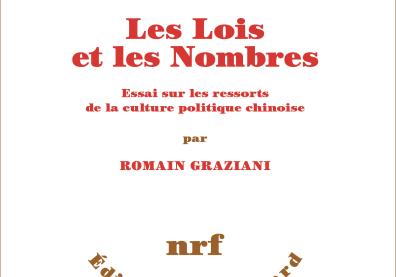Laws and Numbers. An essay on the driving forces of Chinese political culture

Long associated with Confucian ideology, which advocates personal example and government by virtue, Chinese political culture was in fact a pioneer in the development of impersonal, automatic methods for establishing order in the cosmos, the empire and everyday life. This fact, largely overlooked until now, yet constantly confirmed by recent archaeological discoveries, invites us to sketch out a new general history of the Chinese state. It is also important to understand that what we understand in European societies by 'laws' and 'numbers' only partially corresponds to the instruments developed in China, since numbers are not reduced to quantities, and laws are uncorrelated with any idea of law.
In this essay, Romain Graziani draws on both traditional and unpublished sources, touching on mathematics, divination, spiritual exercises, penal codes, the poetic fictions of Taoism and the arts of war, to expose the theoretical forms and concrete evolutions of this Chinese logos. Starting with the "legist experience", he traces the process of depersonalization of authority leading to the experience of the total state, and shows how this paradigm based on laws and numerical data has durably reshaped the experience of time, mobility in space and the vision of sovereign authority in Chinese society; how this ideal of objectivity also helped redefine the notion of work and the individual's relationship to himself; and finally, how it enabled the early formulation of a project for a society structured by information, surveillance and security techniques. At the extreme point of this trajectory linking the Bronze Age to the digital age, the multi-millennial enterprise of "putting the world into numbers" now culminates in the restoration of the ancient cult of the One.
Author presentation:
Author of numerous works devoted to Chinese thought and its modes of expression, translator of texts from the era of the Warring Kingdoms (481-221 BC) and of contemporary literature, Romain Graziani is Professor of Chinese Studies at the École normale supérieure de Lyon. Recent publications include: L'Usage du vide. Essai sur l'intelligence de l'action, de la Chine à l'Europe (Gallimard, 2019); Fiction and Philosophy in the Zhuangzi. An Introduction to Early Chinese Taoist Thought (Bloomsbury, 2021); A Voice for Escape. Tsi K'ang (223-262) and his letter of rupture, followed by Tsi K'ang et l'art de la fugue, Fata Morgana, 2015.